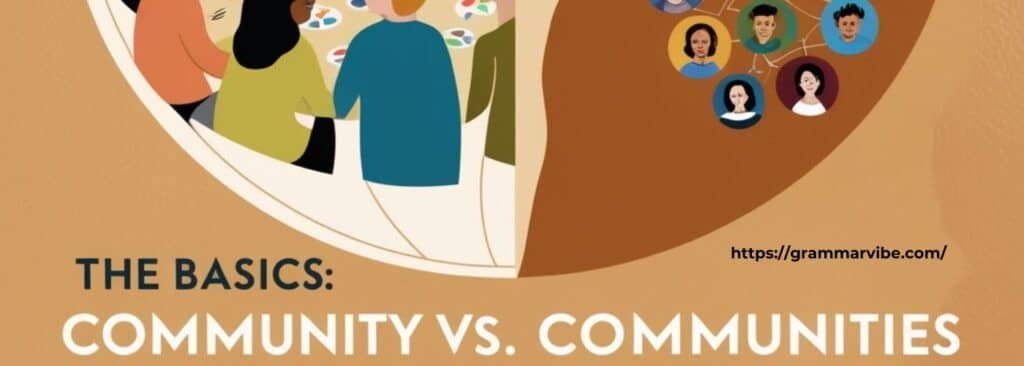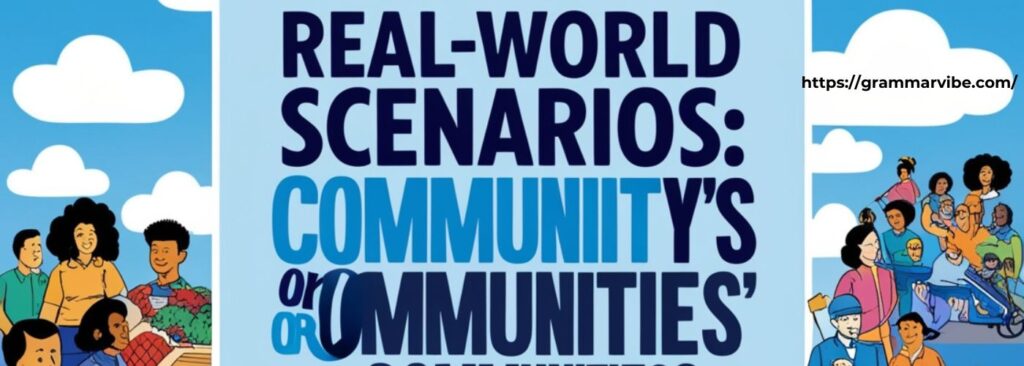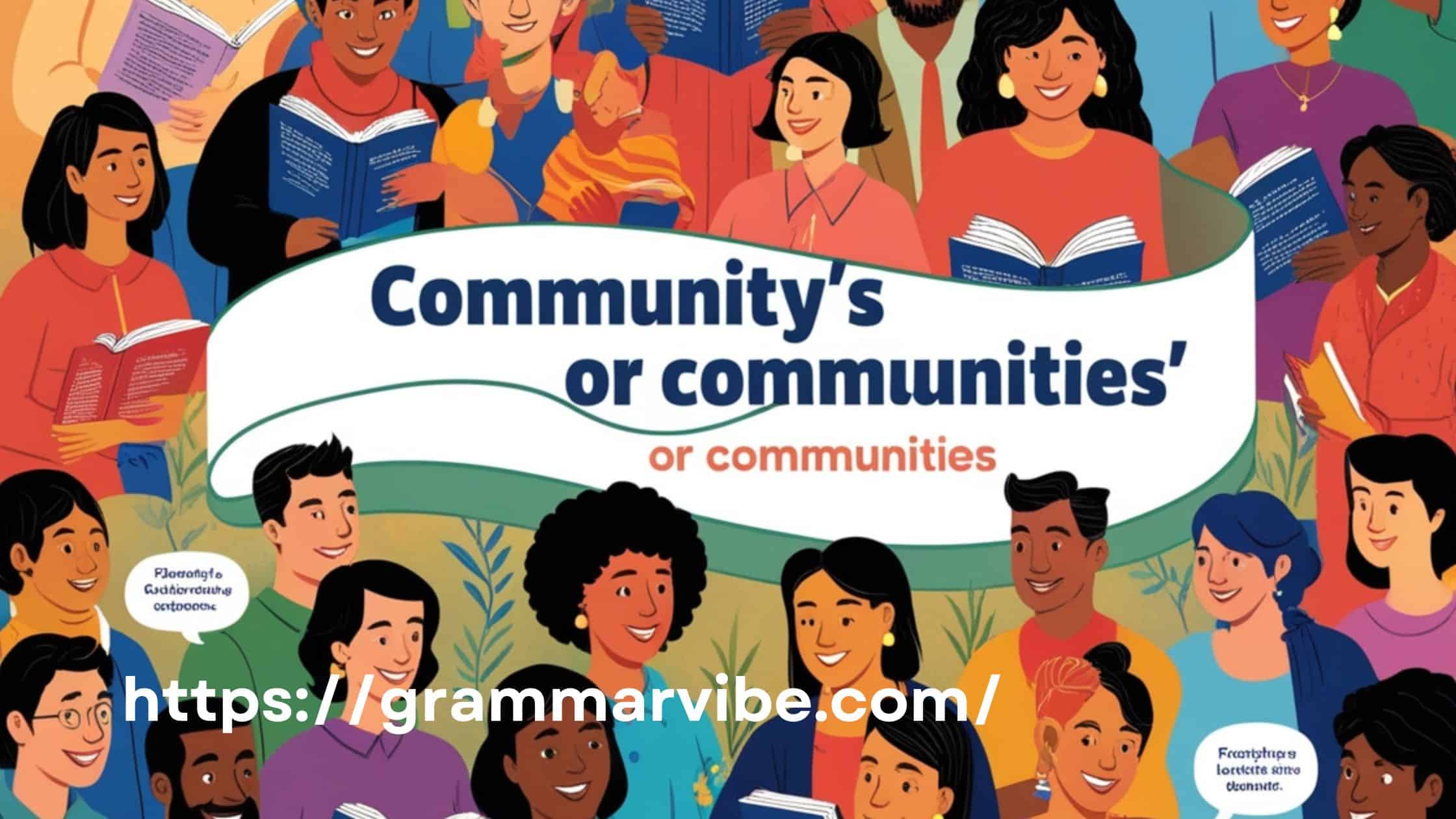In the vast tapestry of the English language, few words spark as much confusion as those involving possessives. Today, we’re diving into a particularly tricky trio: Community, Communities, and their possessive forms.
Understanding the difference between “community’s,” “communities’,” and “communities” can be tricky. This article breaks down the meanings and proper uses of each form to help you choose the right one in any context.
The Basics: Community vs. Communities

Let’s start with the fundamentals. Community is the singular form, referring to a single group of people sharing common interests, location, or characteristics. For example:
“Our small town has a tight-knit community.”
The plural form of community is communities. We use this when talking about multiple groups:
“Urban and rural communities often face different challenges.”
You might also like Student’s or Students’ or Students
Diving into Possessives
Now, let’s tackle the heart of our linguistic puzzle: possessive forms.
Community’s (Singular Possessive)
The singular possessive form of community is “community’s.” We use this when something belongs to or is associated with a single community. For instance:
“The community’s new library has become a popular gathering spot.”
Here, the library belongs to one specific community.
Communities’ (Plural Possessive)
When we’re dealing with multiple communities and want to show possession, we use “communities’.” This is the plural possessive form. For example:
“The communities’ shared resources have led to improved environmental sustainability.”
In this case, multiple communities own or share these resources.
You might also like Business’ or Business’s
Real-World Scenarios: Putting It All Together

To truly grasp these concepts, let’s explore some scenarios where you might encounter these different forms.
Scenario 1: The Neighborhood Watch
Imagine you’re writing about a local safety initiative. You might say:
“The community’s watch program has significantly reduced crime rates.”
Here, we’re using the singular possessive form because we’re talking about one community and its program.
Scenario 2: Cultural Festivals
Now, let’s consider a broader example:
“Various communities’ cultural heritage is celebrated through annual festivals.”
We’re using the plural possessive form because multiple communities are involved, each with its own cultural heritage.
Scenario 3: Environmental Initiatives
Consider this sentence:
“Communities across the country are launching their own environmental sustainability projects.”
Here, we’re using the plural form “communities” without possession because we’re simply referring to multiple groups.
You might also like Wife’s or Wives’
Common Mistakes and How to Avoid Them
Mistake 1: Confusing Plural and Possessive
A frequent error is using an apostrophe to make “community” plural. Remember:
- Communities = plural
- Community’s = singular possessive
- Communities’ = plural possessive
Mistake 2: Misplacing the Apostrophe
In the plural possessive form, ensure the apostrophe comes after the ‘s’. It’s not “communitie’s” but “communities'”.
You might also like Witness’ or Witness’s or Witness
The Broader Context: Usage of Community in Various Fields
The word “community” and its forms aren’t just grammatical curiosities; they’re vital in discussions about social issues, collective action, and more.
In Sociology
Sociologists often discuss how communities shape individual identities. They might write:
“The community’s influence on personal development is a key area of study.”
In Urban Planning
Urban planners frequently deal with multiple communities:
“The city’s plan considers various communities’ needs for parks and gardens.”
In Philanthropy
When discussing charitable causes, you might encounter sentences like:
“The foundation supports multiple communities’ efforts to address local challenges.”
Practical Tips for Correct Usage
- Identify the number: Is it one community or many?
- Determine possession: Does the community (or communities) own or possess something?
- Place the apostrophe: For singular, add ‘s. For plural, add ‘ after the s.
You might also like Luis’ or Luis’s
The Power of Community: Beyond Grammar

While we’ve focused on grammatical rules, it’s worth noting the profound impact of communities in our lives. From neighborhood associations to global networks, communities shape our experiences, traditions, and collective futures.
Communities often drive:
- Collective action on social issues
- Preservation of cultural heritage
- Environmental sustainability initiatives
- Teamwork and mutual support
Whether we’re talking about a single community’s efforts or multiple communities’ collaborative projects, the power of people coming together is undeniable.
Conclusion: Mastering Community in All Its Forms

Understanding the distinctions between community, communities, community’s, and communities’ isn’t just about grammatical correctness. It’s about communicating clearly and respectfully about the groups that shape our world.
From discussing a single neighborhood’s watch program to analyzing various communities’ approaches to environmental sustainability, mastering these forms enhances our ability to convey complex ideas about collective action, social issues, and cultural heritage.
Remember, language is a tool for connection. By using these terms correctly, we honor the diversity and unity of the communities we describe. Whether you’re writing about local traditions, global associations, or anything in between, precision in language reflects respect for the subject matter.
So, the next time you’re pondering whether to write community’s, communities’, or just communities, take a moment to consider the context. Are you discussing ownership, plurality, or simply describing groups? With practice, you’ll navigate these linguistic waters with confidence, enriching your writing and deepening your understanding of the vibrant communities that make up our world.
table showing the different possessive forms:
| Form | Type | Example |
| Community | Singular | Our small town has a tight-knit community. |
| Communities | Plural | Urban and rural communities often face different challenges. |
| Community’s | Singular Possessive | The community’s new library has become a popular gathering spot. |
| Communities’ | Plural Possessive | The communities’ shared resources have led to improved environmental sustainability. |

Kyren Paul is an experienced blogger and the creative mind behind “Grammar Vibe.” With a passion for the nuances of English grammar, he brings clarity and insight to everyday language topics, making grammar accessible and engaging for readers of all levels.











Leave a Comment